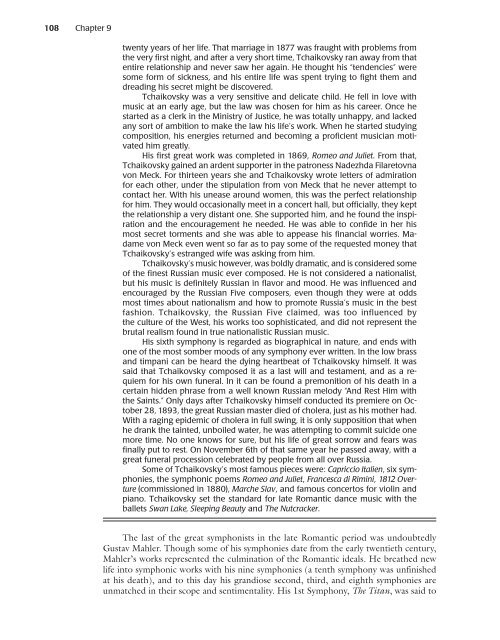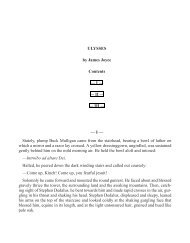Composer Profile - Activefolio
Composer Profile - Activefolio
Composer Profile - Activefolio
Create successful ePaper yourself
Turn your PDF publications into a flip-book with our unique Google optimized e-Paper software.
108 Chapter 9<br />
twenty years of her life. That marriage in 1877 was fraught with problems from<br />
the very first night, and after a very short time, Tchaikovsky ran away from that<br />
entire relationship and never saw her again. He thought his “tendencies” were<br />
some form of sickness, and his entire life was spent trying to fight them and<br />
dreading his secret might be discovered.<br />
Tchaikovsky was a very sensitive and delicate child. He fell in love with<br />
music at an early age, but the law was chosen for him as his career. Once he<br />
started as a clerk in the Ministry of Justice, he was totally unhappy, and lacked<br />
any sort of ambition to make the law his life’s work. When he started studying<br />
composition, his energies returned and becoming a proficient musician motivated<br />
him greatly.<br />
His first great work was completed in 1869, Romeo and Juliet. From that,<br />
Tchaikovsky gained an ardent supporter in the patroness Nadezhda Filaretovna<br />
von Meck. For thirteen years she and Tchaikovsky wrote letters of admiration<br />
for each other, under the stipulation from von Meck that he never attempt to<br />
contact her. With his unease around women, this was the perfect relationship<br />
for him. They would occasionally meet in a concert hall, but officially, they kept<br />
the relationship a very distant one. She supported him, and he found the inspiration<br />
and the encouragement he needed. He was able to confide in her his<br />
most secret torments and she was able to appease his financial worries. Madame<br />
von Meck even went so far as to pay some of the requested money that<br />
Tchaikovsky’s estranged wife was asking from him.<br />
Tchaikovsky’s music however, was boldly dramatic, and is considered some<br />
of the finest Russian music ever composed. He is not considered a nationalist,<br />
but his music is definitely Russian in flavor and mood. He was influenced and<br />
encouraged by the Russian Five composers, even though they were at odds<br />
most times about nationalism and how to promote Russia’s music in the best<br />
fashion. Tchaikovsky, the Russian Five claimed, was too influenced by<br />
the culture of the West, his works too sophisticated, and did not represent the<br />
brutal realism found in true nationalistic Russian music.<br />
His sixth symphony is regarded as biographical in nature, and ends with<br />
one of the most somber moods of any symphony ever written. In the low brass<br />
and timpani can be heard the dying heartbeat of Tchaikovsky himself. It was<br />
said that Tchaikovsky composed it as a last will and testament, and as a requiem<br />
for his own funeral. In it can be found a premonition of his death in a<br />
certain hidden phrase from a well known Russian melody “And Rest Him with<br />
the Saints.” Only days after Tchaikovsky himself conducted its premiere on October<br />
28, 1893, the great Russian master died of cholera, just as his mother had.<br />
With a raging epidemic of cholera in full swing, it is only supposition that when<br />
he drank the tainted, unboiled water, he was attempting to commit suicide one<br />
more time. No one knows for sure, but his life of great sorrow and fears was<br />
finally put to rest. On November 6th of that same year he passed away, with a<br />
great funeral procession celebrated by people from all over Russia.<br />
Some of Tchaikovsky’s most famous pieces were: Capriccio Italien, six symphonies,<br />
the symphonic poems Romeo and Juliet, Francesca di Rimini, 1812 Overture<br />
(commissioned in 1880), Marche Slav, and famous concertos for violin and<br />
piano. Tchaikovsky set the standard for late Romantic dance music with the<br />
ballets Swan Lake, Sleeping Beauty and The Nutcracker.<br />
The last of the great symphonists in the late Romantic period was undoubtedly<br />
Gustav Mahler. Though some of his symphonies date from the early twentieth century,<br />
Mahler’s works represented the culmination of the Romantic ideals. He breathed new<br />
life into symphonic works with his nine symphonies (a tenth symphony was unfinished<br />
at his death), and to this day his grandiose second, third, and eighth symphonies are<br />
unmatched in their scope and sentimentality. His 1st Symphony, The Titan, was said to



